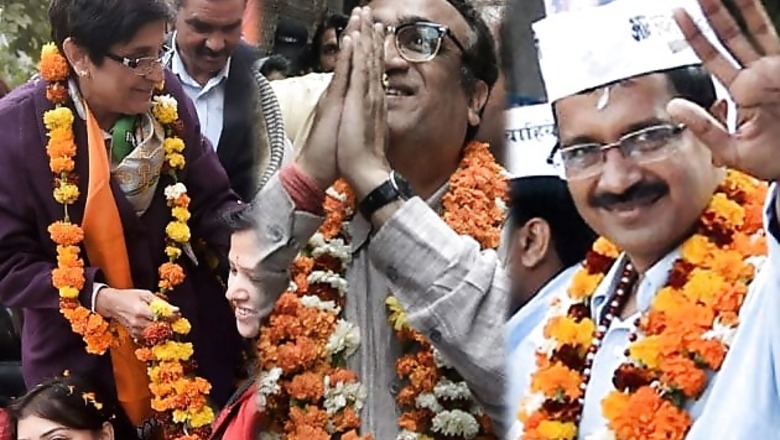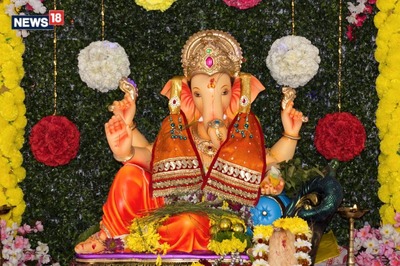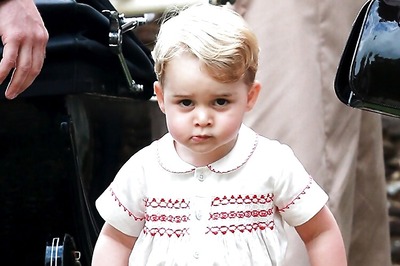
views
New Delhi: Curtains came down on the high-decibel campaign in one of the most-fiercely contested Assembly elections in Delhi on Thursday where BJP has staked its all on Prime Minister Narendra Modi's image against a resurgent Aam Aadmi Party in the February 7 polls.
Roadshows by AAP Chief Arvind Kejriwal in the prestigious New Delhi constituency and Congress leader Rahul Gandhi in Sultanpur Majra capped a day of nearly 100 rallies by leaders of various parties including BJP president Amit Shah as campaign ended at 6 PM.
After the end of the campaign marked by bitter political attacks and allegations and counter allegations, workers of the major parties fanned out on a door-to-door canvassing in 70 constituencies.
The BJP, which is out of power in Delhi for the last 16 years, made a gamble by brining in former Team Anna member Kiran Bedi as its Chief Ministerial candidate which is said to have triggered discontent among the party leaders and rank and file.
The BJP strategy has been countered by Kejriwal-led AAP which has put up a spirited campaign in a bid to stop the Modi juggernaut that has been on a roll ever since the Lok Sabha election victory in May, 2014.
Already BJP leaders Shah and Union Minister M Venkaiah Naidu have said that the Delhi election is not a referendum on the Modi government's performance, a statement seen by critics as an effort to shield the Prime Minister from any criticism.
The Congress which had ruled Delhi for 15 years till December, 2013 has been projected way behind AAP and BJP in pre-poll surveys. Some opinion polls have given AAP a clear majority while a few have predicted BJP's win.
After both internal and media surveys projected a not-so-happy picture, the BJP deployed all its top guns including Union Ministers Rajnath Singh, Arun Jaitley, Sushma Swaraj, Ravi Shankar Prasad, Uma Bharti and M Venkaiah Naidu in the campaign along with 120 MPs and leaders from states to woo the people from various regions.
The BJP campaign got a boost with the Prime Minister addressing five rallies in which he mainly targeted AAP while appealing to the people give him an opportunity to help Delhi reach new heights in development.
The AAP shifted tack and concentrated on door-to-door approach and corner meetings. Towards the end, the party had to confront a dissident campaign when some of its erstwhile members came out with allegations of dubious fundings against it over receipt of four cheques of Rs 50 lakh each in April last year.
The BJP latched on to the dissident campaign and mounted a fierce attack on the party saying while it claimed high moral in its speeches it was doing the opposite in practise. With Modi and Jaitley attacking Kejriwal on the donation issue, the AAP chief dared the government to arrest him while offering himself and the party for any kind of probe.
Congress which projected former Union Minister Ajay Maken as its Chief Ministerial candidate, brought in party chief Sonia Gandhi for addressing only one rally while Rahul addressed five rallies.
While the 2013 election threw a hung assembly with BJP winning 31 seats and AAP 28, Congress got only 8 seats. Others won 3 seats. An AAP-Congress post poll alliance was short lived as Kejriwal resigned as Chief Minister after 49 days.
To counter the image as a 'runaway' leader, Kejriwal disarmed his detractors by apologising for his resignation and said he will not commit such a mistake in future.
A total of 673 candidates are in the fray. Burari constituency in North Delhi has a maximum of 18 candidates while the Ambedkar Nagar seat in South Delhi has the lowest four contenders.
The Krishna Nagar constituency, from where Bedi is contesting, has 13 candidates. Another high-profile constituency is Sadar Bazar, from where Maken is contesting. The Election Commission said a total of 1.33 crore voters are eligible to exercise their franchise out of which around 1.50 lakh are first-time voters.
Voting will take place at a total 11,763 polling stations and the Election Commission said elaborate security arrangement has been made to ensure a free and fair polls.
The BJP came out with a Vision Document instead of a manifesto in which the party laid down a road-map to make the Delhi a world class city. It, however, did not spell out BJP's position on full statehood to the national capital which it had promised in its manifestos for the 2013 assembly polls and past elections.
The Vision Document promised to address shortage of water, ensure round-the-clock power supply, proving houses to slum dwellers and making the administration responsive and people-friendly.
The AAP in its manifesto promised full statehood for Delhi.
The AAP manifesto was full of pro-people announcements as it promised 50 per cent cut in power tariff, free Wi-Fi across Delhi, installation of 10-15 lakh CCTV cameras for women security, making water a legal right and bringing down the VAT significantly among others.
Congress made an array of promises in its manifesto like significant cut in power rates, wi-fi facilities in public transport, waving off pending water bills and ensuring a graft-free administration if voted to power in Delhi.
















Comments
0 comment